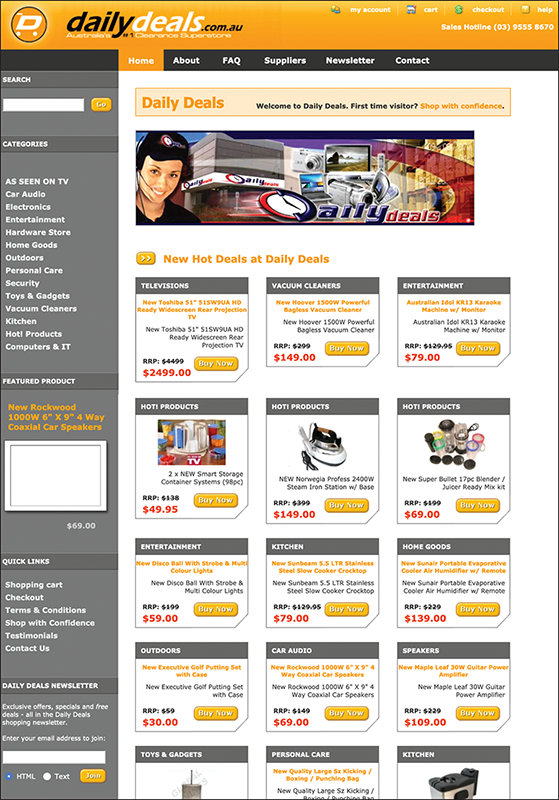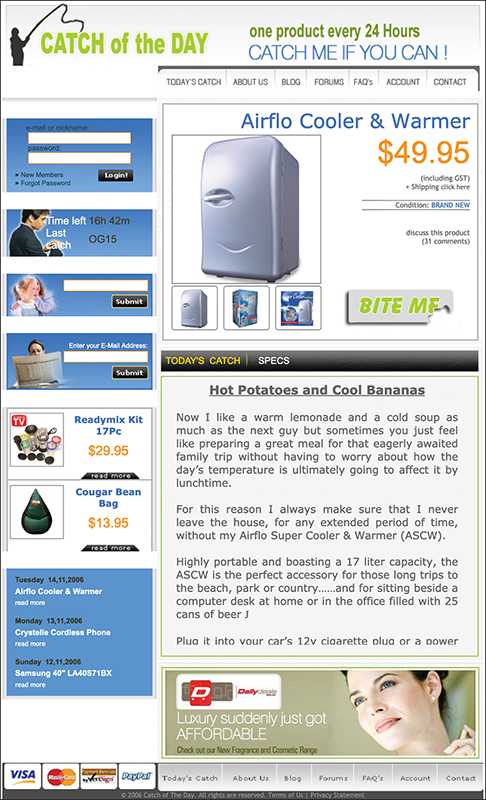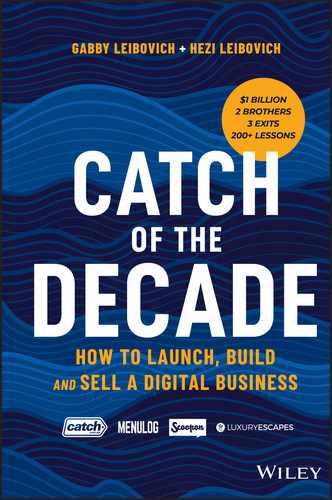CHAPTER 2
Working together
Once we had ‘merged’ our operations, we decided to take a risk and find an office/warehouse to have some space from where to operate our small business. Feeling very grown up, we signed a lease on a 180 m2 warehouse at Roberna St in Moorabbin, just 13 minutes from home.
The business was still quite small, but it was moving in the right direction, getting more customers and making more money. Our first specialist ‘hires’ were two new immigrants with a background in e‐commerce. Vijay, newly arrived from Malaysia, was brilliant at all things tech and IT; and Ferry, from Indonesia, was our computer programmer. We also hired some other guys to staff the warehouse, photograph the products, do the buying and manage customer service.
Looking back, we can see why we gravitated towards these guys. They were intelligent, hardworking allrounders with a passion to succeed, just like us. And the team just clicked. Our workplace was very egalitarian, more by chance than design. None of us knew what we were doing, none of us were experts at anything and none of us had better jobs than the other; we all just pitched in and did what needed to be done.
- If a container landed from China, we all unloaded it together.
- If the warehouse had more orders than we could handle, someone would stop what they were doing and help out.
- If there were lots of emails, we all stayed as late as required to clear the mailbox.
- If a customer stepped into the store, any one of us would serve them.
You did what you had to do!
At this stage we had four separate arms to the business:
- the DailyDeals.com.au online department store
- the Daily Deals eBay store
- a direct‐to‐the‐public warehouse shop (selling the same items we sold on eBay)
- ‘As Seen on TV’ television advertorials.
Those early days of 2006 were a massive learning curve for us. We were a true start‐up, or as it was known then, a small business. We had no formal business plan, and had to learn everything on the run: from payroll, tax and accounting, to legal, HR and marketing. We did everything on the cheap—and we still do, if we can. Some call this being frugal. We call it being smart. We're amazed when we see start‐ups spending money on EAs, PAs, VAs—Oy Vey!—and they haven't even made a sale, let alone a profit. We're even more amazed that some start‐ups take three or four years, even a decade, to turn a profit.
We know there are lots of different business models for how start‐ups can operate, and deferring profits to generate sales is a valid rationale, but as retailers with a background in markets, we felt then, and to some extent still feel, that a business is meant to make money from the start. Did we ever expect our start‐up to get so big? Hardly. We were just trying to keep it afloat, pay the salaries and make the rent.
The day eBay shut us down
So, there we were, a bunch of guys operating mildly successful, but largely unheard‐of, eBay stores out of our little office in suburban Melbourne, doing okay and living nice, simple lives. And it probably would have continued this way except that, for some inexplicable reason, eBay decided to suspend our trading account.
This action basically shut our business down overnight. We tried valiantly to get in touch with eBay to sort it out, but we couldn't find anyone to take our call. Their customer service team at the time sat in Canada and was only dealing with sophisticated larger sellers and ignored all our cries for help. We couldn't trade and were losing money, and customers, fast. This lasted for 15 days, and it began to bite. They eventually restored our account, but this stressful situation taught us three big lessons:
- Don't put all your trust (or eggs) in one platform.
- Own your own platform (if you can).
- Take responsibility for growing your own database (because whoever owns the customer owns the gold).
Yes, it's far more work to generate your own sales and sell direct to the consumer, but at the end of the day that's where the relationship is made.
From that moment on, we took the growing of our website, DailyDeals.com.au, very seriously. We were lucky in that we could spread the risk over the four main arms of our business, but we decided to focus on this one website to see how fast we could grow it and how far we could take it.
In those early days, there were many constraints to growth, but what fuelled our passion was the fact we were all in it together. Our team was working to capacity, exhausted from the labour of the day, and working hard with minimal resources to make it all happen. This pursuit of success against the odds created a sense of camaraderie and forged firm friendships. We didn't know it at the time, but we were forming what would become the core culture of Catch.
We wish we had a photo of our magnificent team to show you, but sadly it was a different world in 2006, and we just didn't take any. ☹
(Incidentally, Vijay stayed with us for 10 years and became Chief Technology Officer (CTO) of the whole Catch group. Ferry, our first programmer, is still with Catch. He outlasted the founders!)
Nowhere to go and no way to grow
By June 2006, we had seven employees and a super mediocre website (DailyDeals.com.au) that sold about one hundred products a day. We were paying the bills, and doing okay, but no matter how hard we worked we just couldn't seem to grow the business. It felt like we were capped by our circumstances in every respect: we had limited money to buy stock, limited staff to manage the current demand, limited space to store the stock and limited manpower to source the deals. And worst of all, no quality brands wanted to sell to pure‐play online sellers like us. It was incredibly frustrating and we didn't know how to fix it. We knew what we wanted to be; we just couldn't quite get there. We saw others doing it but couldn't work out how to compete.

Our early DailyDeals.com.au website, the precursor to what Catchoftheday would become*.
The big daddy of them all was Deals Direct, Australia's first true online department store, founded by Paul Greenberg and Michael Rosenbaum, the guys who had bought the scooters from us years earlier. Deals Direct had 60 employees, a massive warehouse and was run by smart guys who knew what they were doing. They were the whale; we were the minnow. They had 5000 products; we had 100. How could we compete? We had to find a way to be different. But what was it going to be? How could we create a point of difference when we had nothing new or different to offer?
Better to copy and excel than to be original and mediocre
Woot is a US‐based daily deals concept website. A friend showed it to us after a flight we were meant to catch together got delayed. (What a profitable delay that turned out to be.)
Woot's concept was simple: they sold one product every day at midnight. The deal lasted for 24 hours and then the sale was over. The website was written with a cool style of copywriting that was both arrogant and funny and had a ‘I don't give a fuck’ vibe to it, which we really liked.
Woot mainly sold electronic items and because the prices were so good, the items would sell out within hours—often in minutes! We liked the concept a lot. The best part? No‐one in Australia had ever heard of Woot, so the concept was wide open for us to copy … er … be inspired by. Our motto had always been ‘better to copy and excel than to be original and mediocre’ and this was no different.
It was time to rewrite the rules.
What's in a name?
We truly believed that we could be the Woot of Australia, so we went for it. We've both never forgotten the night we chatted together on Messenger trying to come up with a name for this new‐style website that would sell one product a day. The conversation went something like this:
 Hezi
Hezi
Gabby 
 Hezi
Hezi
 Hezi Gabby
Hezi Gabby 
 Hezi
Hezi
Gabby 
 Hezi
Hezi
And on it went. Blah, blah, blah … Anyway, after much debate, we decided on Catchoftheday.
Just to be clear, at the time of launching, none of us thought this website would be anything more than an additional stream of income to the other four we already had.
The web page we launched with was super basic: just a simple logo of a fisherman, a counter that counted down from 24 hours, a single product and a product description with a sales spiel that walked the chutzpah line of brazen, arrogant and blatant. You can see from our original web pages that we certainly didn't wait for perfection in order to launch the site.

Our first iteration of the Catchoftheday website. Never forget: every first draft of anything is shit.
Here's a quick tip: don't wait for perfection to launch your website. Entrepreneurs often make the mistake of waiting for perfection before launching a product or a business, not realising that for every moment they procrastinate, they lose valuable time and money. Take our advice and just focus on the features that make the product work—that distinguish it in the market—and release it quickly to capture the opportunity. All the rest—the ‘nice‐to‐have’ features—can come later.
As co‐founder of LinkedIn Reid Hoffman said, ‘If you're happy with your first draft, you've launched too late’. Or, as we like to say, the first draft of anything is shit.
Landing the first catches
Our next job was to find some amazing launch deals for our new website. We called every supplier we'd ever met, and asked them to come to the party with some sharp deals for our new site. We had no idea how hard that was going to be.
We'll never forget one of our first supplier meetings. It was with Power DC, a battery distributor run by a father‐and‐son team at an office just 300 metres from ours. We were so excited to tell them about our plans to launch this incredible site that would sell just one product every single day. You could tell by the look on their faces they thought we were crazy. A deal a day? On a website? Paying online with a credit card? This will never succeed! That was the response we got from most suppliers in those early days.
Our launch product was a great deal: a Thomson‐branded DVD recorder for $99. We managed to source 300 of them at an amazing price, selling them for 50 per cent less than any other retailer. On the night of 18 October 2006 our team of seven was at the office at midnight awaiting the big launch countdown. The anticipation was building.
10, 9, 8, 7, 6, 5, 4, 3, 2, 1:
Catchoftheday is live! Drum roll!
Within a couple of minutes we managed to sell 13 of the DVD recorders, and then boom … the site crashed! We simply couldn't handle the traffic of these eager customers! For the next two hours our tech team, Vijay and Ferry, tried to solve the issues, but with no luck. The rest of us were answering emails from disappointed customers giving us crap for the miserable effort. We all got home at 4 am, had a short sleep and were back in the office by 8 am the next day. This routine continued for three days, and we were all kaput by then. This was unsustainable. Something had to change.
What did we do? We moved the launch time of our deals from midnight to midday.
Catchoftheday was born and our Fair‐EtailTM* was about to begin.
You're only as good as your last deal
Adding this new Catchoftheday business to our other suite of sites was not without its challenges. It put a strain on our finances, created more work for everyone and added pressure on us to find a great deal every day. And it's fair to say that without an A‐grade deal each day we didn't have a business. With this newfound obligation, we began to feel the weight of customer expectations and quietly questioned why we'd started the thing at all.
We knew we could get away with ‘okay’ deals for a day or two—or even for three or four days—but if we had a run of seven average deals, we just knew that by day eight we were dead because customers wouldn't be coming back. On many days, at 9 am, with just hours to go before launch, we'd stare at the ceiling, praying and hoping that somehow a great deal would fall from the sky. We believed that if our customers gave us their time and trust by regularly visiting our site, our job was to make sure they were delighted and would return the next day to see what's on offer. Our livelihoods depended on it, and that's what made this business model so hard for our competitors to copy. But we pushed hard for these deals, knocked on many doors, banged on a few, and took the third door occasionally, and sure enough, the deals began to flow. Slowly, the word about our great deals began to spread.
To niche or not to niche?
After realising that we couldn't be all things to all people, and that many of our categories only had a small number of products on offer, we decided to forget about competing with Deals Direct and forge our own way by doing two things. Focusing on a narrow range of products for a specific target market and offering the products at bargain basement prices. It was a risk focusing on a narrow range of products for a specific target market at bargain basement prices. It was a risk but, in all honesty, we had no option. We couldn't afford to do it any other way.
This strategy worked because it let our customers know they were guaranteed to get the best price in the country, which made them pay attention to the deal, even if it was for something they didn't really want or need at that time. The fear of missing out on the deal made them take action.
The strategy also made our product the very best deal available on any given day, saving us a huge amount of time and money by not having to stock thousands of products. Instead, we were able to purchase thousands of a single product at an incredible price, which resulted in us getting a better deal. We also sold more of it than any other website selling the same item.
While this focus allowed us to dramatically improve our profits, it did have a drawback. We knew we couldn't please everyone and that some people would get upset with us if the deal of the day was not to their liking. But we also knew that there were enough boring department stores out there selling the same stuff already, and that if people wanted to buy the traditional way in a traditional store, there were plenty of places they could do so. We just weren't going to be one of them.
Through trial and error (and a bit of luck—more on that in a moment!) we had stumbled on a formula that was exponentially more economical and better suited to our limited resources, and it was working.
Notes
- * How did we find all these old web pages? There's an amazing website called The Way Back Machine (aka www.web.archive.org). Insert any URL and you can see the archived pages. It's amazing.
- * We made this up and like it so much, we're going to trademark it.
- * Thank you to Lior Shoham for introducing us to this concept.
